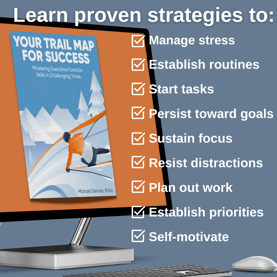I was cruising down the Massachusetts Turnpike, breeze in my hair, with just enough time to arrive a little early for my meeting, when I realized that I was supposed to be heading east, not west. My arrival would not be five minutes early; it would be ten minutes late due to this nasty thing called physics. How did this happen to me, an Executive Function coach? (And, heck, the owner of a company that teaches Executive Function skills to people!)
a little early for my meeting, when I realized that I was supposed to be heading east, not west. My arrival would not be five minutes early; it would be ten minutes late due to this nasty thing called physics. How did this happen to me, an Executive Function coach? (And, heck, the owner of a company that teaches Executive Function skills to people!)
Well, the short answer is that I went the wrong way, but that begs the question. Could it have been that I left late and messed up the directions in my haste? In the past, I used to be late most of the time. I would look at emails for just a little too long, valuing my completion of tasks over a timely arrival for a meeting. Thanks to some tough conversations (and more than a few dirty looks thrown my way), I finally faced up to the consequences of breaking social contracts by my habitual tardiness. I decided that it was more important to show respect for people by keeping my commitments than to press "send" on those last few emails in by inbox. At the time of my Turnpike mishap, I had actively developed the habit of being on time for over three years and was generally pretty good about it. Time was not the culprit here.
In this case, the problem was muscle memory - or more precisely, neglecting to pay enough attention to my task to override muscle memory. For years, I had gotten onto the Pike to head west for work. In my new job, I rarely had to drive at all, so when I did, my car, guided by my hands connected to well-worn pathways in my brain, simply defaulted to the far more common experience of heading in that direction. The Steve Miller Band did not help. “I went from Phoenix, Arizona all the way to Tacoma, Philadelphia, Atlanta, LA …” was not only blasting from my radio but emanating from my mouth. Distracted by the supportive if imaginary crowd in my mind, driving was set to automatic. Unsurprisingly, the person who I was to meet with was surprised that I was late. Our public personas can be very convincing.
Being an Executive Function coach (or owner of a company or anything else) doesn’t necessarily mean you are naturally good at every Executive Function skill. My areas of natural weakness include but are not limited to the following: mood regulation, particularly tolerating frustration; task initiation on things I find boring; sustained attention (yep, on boring things); and listening to others when they say things that are clearly wrong (meaning that they don’t agree with me.)
Fortunately, functioning as if you have good Executive Function skills is enough to do well. To boost your performance, you can learn compensatory strategies and you can leverage your strengths. Over the past 15 years or so, since I started this company, I've learned a lot about helping others use strategies to develop their capacity to manage themselves. I wrote my first book in 2018 for parents who wanted to support their kids' challenges - and it was gratifying to hear from folks who found it useful. The global pandemic found me searching for ways to next lend some support to adults who were struggling to manage their work and personal lives amid a chaotic landscape and unpredictable timelines for a return to "normalcy."
When you download my new free ebook, I will be teaching you compensatory strategies, including both broad principles and specific tools, that will allow you to accomplish your goals. From mood management to starting and staying focused on challenging tasks to prioritizing, planning, and organizing, you will learn how to experiment with new approaches, reflect on what works and doesn’t, and make small but meaningful changes that have significant impact over time.
My premise is that our potential is, by and large, almost unlimited and definitely unknowable until we actually achieve it. Here's to discovering your own potential!
 Download our free 20-page full-color ebook for adults, Your Trail Map for Success: Mastering Executive Function Skills in Challenging Times.
Download our free 20-page full-color ebook for adults, Your Trail Map for Success: Mastering Executive Function Skills in Challenging Times.
